I happened to be sitting in front of Mexican director Carlos Reygadas when his film Battala en Cielo premiered at Cannes, to thunderous applause and a wildly ecstatic standing ovation. The film--a quirky story about a rich girl who plays whore in a brothel and her chauffeur who kidnaps a child, only to be stricken with remorse when the child accidentally dies--had emotionally stunned the public, although later critics could not say why. Some even went so far as to fiercely denounce the work as "pretentious." What was this strange mix of powerful visuals and engineered sound (a key scene is a gas station, where extra-diegetic classical music blares in the night) that begins with the young girl fellating her plump unattractive chauffeur--with full graphic view of the genitalia--to Beethoven? 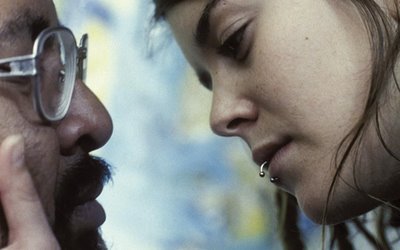
I had asked the feisty Carlos at the time--later beside a pool, his hair wet and he wrapped in a towel--to explain the meaning of the film: was it saying something about class (chauffeur/rich girl) or Mexico as a nation-state (many images pop up of soldiers in a plaza, with the national flag being raised) or religious sentiment (the chauffeur goes through a via dolorosa, crawling on his knees in a pageant to a church, in a move towards redemption)?
Nonsense, Carlos had retorted. People always want meaning, meaning, meaning. Or "story." He himself just put down whatever came to his head. Why couldn't his film just be appreciated as film qua film, just as music is appreciated as music? You don't try to explain--in words--Mozart's requiem!
Yet Reygadas' two other highly appraised films--his first Japon (hailed by critic A O Scott as a masterpiece) and his recent Stellet Licht (considered one of the 20 best films of 2008)--both had, along with the same odd mix of powerful visuals and engineered sound, a "story".
The story indeed seemed similar: an alienated man, like the chauffeur, seeks to find his true path, after having gotten off-track. In Japon, a man named simply El hombre goes up to a canyon (hitching a car ride with Mexican paisanos, with sublime baroque music soaring through the hills) to rent a room from "Ascen", an elderly woman. The rreason: to kill himself. Yet, stunning moments shift the man from his intention: a dead horse in the rain, a fence being painted red, a bird shot with three holes, and awkward sexual intercourse with the nonagenarian woman.
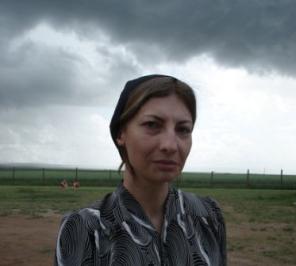
Stellet Licht ups the ante of the sublime. Here a man in a strict Mennonite community, married happily with beautiful blonde children, falls passionately in love with another woman, hence going against the "rules." The movie traces his journey of angst and confusion, through long Tarkovsky shots of tractors raking yellow wheat, a watery paradise with the children in a river, and shots of a wide open blue sky.
The movie begins and ends sublimely as well: with a time-lapsed sunrise and sunset, breath-taking images which critics unanimously agreed would go down in film history. And at the climax, there is a homage to Carl Dreyer's Ordet, where a miracle of life and death brings the film story to a crescendo.
I spoke to Carlos, after this more recent premiere--over a tequilla in Mexico City--and again, Carlos was cryptic:
"Do you believe in magic?" I asked.
"Life is magic!" Carlos said with his typical energetic verve.
I went back to find Carlos, in his native Mexico, to see if I could get any further. I also wanted to ask him if he would contribute to my book-in-process, comparing film directors to shamans, based in anthropological theory about how people use the imaginary to create "magic" outcomes. How does a film director lead the audience on an emotional and spiritual journey, much like the shaman in an indigenous ritual? For while the director's characters--Marcos, El hombre, Johann--reach transcendent redemption, my intuition was that something similar happened to the audience watching. Every person who has seen Reygadas' films comments similarly: "His films move me more than anything," said a young Algerian critic. Or, as the Mexican engineer sitting next to me right now in the internet cafe opined: "I saw his Japon by accident in Brazil, and it wowed me so much I saw it three times Perhaps it is because I too am from Mexico City and could just imagine what this journey means."
My question: what exactly is the director doing to achieve this profound effect--this near religious experience--for his public?
Carlos agreed to meet me in the sacred mountains of Tepoztlan, one hour from Mexico City, where he imparted he was building his own home.
So the next morning I took a taxi from Cuernavaca, up a winding road into the grassy bush, bumping over the first road tope that Carlos had given me as a landmark, to turn left on a rocky path.
Going up the mountain, I realized I felt like one of his characters mounting the canyon--or, as in Battala en cielo, getting lost in the fog in the "ascent." But there was Carlos, bounding out to greet me, in his brown baseball hat and--in what was a curious turn--a full bushy beard.
.....................................................................
"Okay, let's start with breakfast," Carlos said, with a great grin, climbing over the fence, and directing his workers, who were building his "log cabin" down the road, in the woods, to wait for him.
"What's going on here?" I asked.
Carlos eagerly explained he had come across an old wooden house in Michoacan which was being destroyed, and had transported the wood--plank by plank--to these mountains to build his own home. "Many people could do the same," he said. "You just need the imagination and the willpower."
"Much like making a film."
"Yes, of course."
The wooden planks were important to him qua wooden planks, just as some stones he had once seen, long ago, in a rubble in Mexico City were important to him. He had had the stones transported to his grandfather's English hacienda in the countryside, and now--twenty years later--he was going to use these stones to build his kitchen.
"Why are stones so important to you?"
I had participated already in a few shaman ceremonies in Mexico, and I had been struck by the importance of natural objects: a feather, a burning fire, a rock from the madre tierra. I had been similarly struck by the bold shots of rocks in Carlos' films just lying in the grass in the mountains. Could this be the connection between film and shamanism: the attention to the sublimity of natural objects?
"Well look at that stone there, for example! Look at it."
He was pointing over my shoulder--we were now having breakfast in a villa he had rented down the road--at some rocks in the bush.
"Which stone?"
He jumped up and pointed excitedly. "That one, that one, with the green moisture on it....what is it called? Moss."
He went on. "It has so much in it. History. It must be three hundred years old."
"Or a thousand."
"Whatever. It is alive, it speaks. It's....beautiful."
He sat back down, wordless.
We ate our home-made toast with tomatoes and olive oil ("which is quite good in Mexico too") and banana and mango salad. I observed that Carlos' film Japon ends with a shot of stones, lying on a railroad track--- a riveting image, especially since part of the film is about taking down the old woman's barn, stone by stone.
"I had not noticed that," Carlos said. "But it's true, the stones on the track are important to me. I would never have filmed the tracks the way I did, with a backwards dolly, if they were not."
We turned to a specific discussion of shamanistic ceremonies.
It turned out Carlos had had his own experience with the typical Mexican forays into this domain: peyote, ayahuasca, mushrooms etc. But he had preferred to do these experiences alone--not in rituals.
"Rituals! I hate rituals! Why do you need rituals to appreciate the immensity of life? Why do you need rules? People need rituals to fill the vacuums of their lives."
"But don't rituals expand the appreciation of things? The ritual of this breakfast, for example: look you have plates here, we are sitting down at a table..."
A very nice wooden table, I would add, on a shaded veranda facing the mountains.
"We could eat with our hands! We could do peyote with some friends sitting on the ground. We don't need rituals!"
"But wouldn't you say a film is like a ritual? For example, to make a film, you organize your people, your team...."
"Not at all! You just make it, step by step, getting ideas. There are no rules! A film is NOT a ritual!"
I had to laugh at the vivacious anger in Carlos' face, comparing his words to the Santo Daime religious ceremony I had been at the night before, in the nearby Tepoztlan hills. There, participants dressed in white and sat around an altar, men on one side, women on the other, and before entering had to be purified, one by one in a line, with a smoking kettle. We were not allowed to leave our seat, and had regular Brazilian hymns to turn to, praising Dai-me ("give me" life, "give me" love) in-between regulated sessions of taking the "Eucharist": the ayahuasca plant concoction famed for its horrible taste (a mixture of bile and Chinese oyster sauce).
The Santo Daime practice--a syncretic mix of Brazilian indigenous practice and Spanish Catholicism--would be something Carlos would hate, I intuited.
Yet Carlos interwove his films with ritual references: in Japon, the man lies naked in his bed, reflecting, as the camera cross-shots to a priest raising the Eucharist. In Battala en cielo, Marcos, the chauffeur, makes love to his wife while a huge crucified Christ looks down. Indeed, crosses abound in Battala en cielo--long lingering shots on the perpendicular effect. And each of his films has a beautiful religious sense: a feeling that the characters are in search to transcend themselves--with the bric brac of our cultural symbols.
"Do you like crosses?" This I asked Carlos as we walked back along the path to Carlos' cabin.
"I LOVE crosses."
"Why?"
"You're not a Catholic?"
"No I am not a Catholic. Of course, I am Mexican and this is a Catholic country."
But he was in some sense religious. As he had said in our earlier interview: "I don't think what happens in the Bible is so different from reality, even if I do not believe in them literally. I think reality is a miracle. "
"And the most sacred moment of your life?" I paused in the wooded lane. "Wait. I bet you are going to say what everyone says: when your little son was born." I had just met the little blonde child, standing in the doorway, arms open, with a Charlie Brown grin on his eager face.
"That's bullshit. How easy and lazy for people to say that! Their child being born! Sure I was there when Eleazar [which means "God has helped"] was born. I caught him in my arms in the water. But that was not the most sacred moment of my life. Everything is sacred. Look around you! A plant growing is a miracle. So is a stick!"
He picked up a stick. "Look at this stick! It shines. It gives off light. It has a charge to it. It has so much going on. Look at all the lines. Look at this rough bump. A child being born! If you only think having a baby is incredible, you are blind. People fill their lives and avoid their fear of death with idea of children. They don't ask questions. I respect more someone saying they will have baby cynically so he will take care of them when they are 65."
He tossed the stick way into the bush.
"So what does that stick mean to you?"
"It's a stick. You don't have to say what it means."
As we approached his cabin, he stopped to speak to three workers in sombreros, who were raking up rocks in the grass. He pointed into the bush--there, there, a tree should be planted. He strode four yards, and here another. And...he gestured into a bush.....here should be a fourth.
"Bueno capitano." The worker began to dig.
"You are not as spontaneous as that!" I said. "You have thought about where your trees will go?"
"Yes, I have thought about it."
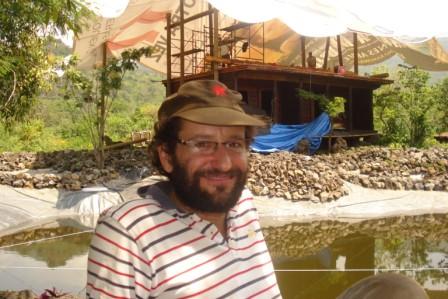
We went up to sit by the "fresh pond" Carlos had dug for his home: a natural swimming pool where the algae, plant life and fish would keep it clean for swimming---not Clorox. He would also have ponies later for his home, for as a child on his grandfather's home: he used to ride (his great-grandfather, a lawyer for an English mining company in the 1830s, had passed the English home down to his descendents).
And over there, behind the trees, he would have his film editing studio. His wife was a film editor.
As we sat on a rock in the trees hiding from the workers, I asked Carlos why he privileged, along with frontal shots of houses and nature, such long steady shots on people's faces.
"Because faces tell so much. Much more than words. Seeing a person says so much. Their energy, who they are."
"You like that?
"Yes, I like that as much as I like scratching my neck right now. I like being. People forget about that. To just be."
His dog bounded between us and Carlos grinned, cuddling the dog to his lap. "It's a she," he said, as the dog began to bark furiously. "She hears the dogs barking over there. Dogs hear ten times what we do. It's amazing!"
He went on. "You know, one should have a day not to do anything; like the Jewish Sabbath, just to do nothing and make love."
Being with Carlos, even on an interview, gave this impression of "not doing anything", of just appreciating the rock we sat on, the sounds of the planks being nailed, the sun mounting higher over the trees. Perhaps it was his constant inquisitive attention to what was going on around us that gave the feeling that time was happening densely right then, much like in Stellet Licht, the clock--human time--stops, to allow the greater rhythm of the universe, the rise and fall of the sun, to take precedence. One spectator I met had commented that what overwhelmed him about Carlos' films was that he felt invited to "feel", rather than to think. "He invites us into the story," he had said.
And there was something in common with how Carlos responded to the phenomenological "is"ness of things, with how shamans I had met responded to my questions of the meaning of the symbols in their ceremonies. "Why is the sun a God?" I had asked a Huichol shaman. He had pointed up: "LOOK!"
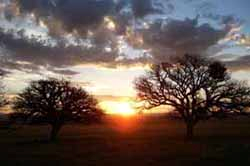
And yet did Carlos believe something was "behind' the surface of our incredible reality? I wanted to probe his concept of the sacred.
"How about when the mistress in Stellet Licht raises her hand to the sun? It is just before she performs the miracle. Is she drawing power from the sun?"
"When she raises hand to light, she is just raising hand to light." Carlos responded quickfire--but then in a more serious moment added: "Well actually I want to be modest here and not say what everything means.
This director--considered one of the most spiritual of our times--had much the same response when it came to "the soul."
"Sure I agree with the "soul". But I don't have to say it. Or speak about it. What do words do but cut you from the experience?"
There was something consistent in Carlos Reygadas' obstinate paradoxes, in both his conversation and his films--and this in the years I had known him. I noted that his characters are all the same, in that they seem existentially alone. Carlos smiled with a beam in his eye. "Yes, I guess that is true, although I haven't thought about it. Except they are not always alone: Johann has friends, for example. He sings in the car. And El hombre in Japon jokes with the workers. Marcos makes love to his wife.... "
He continued. "It's like me too. I am philosophically alone--we all are, we are born alone and we die alone--and yet I am also happy with people. You can hold different emotions at the same time."
Along the same lines, his films--seemingly ending on a happy redemptive note--might actually be sad. After all, Stellet Licht, despite its miracle, has a poignant aftermath: the man at the end gives up his beloved mistress for his wife.
"What's so sad about that? Who is to say that getting your romantic needs met is more satisfying than making a sacrifice? Sacrifice can be better than getting what you want in love. Not only one thing makes you happy."
As the noon sun rose high in the mountains, it occurred to me that I--lulled into the pleasure of the natural landscape--had still not broached the question of the meaning of his films for spectators. How were these long existential voyages--through natural objects, encounters, emotions--like the religious ceremonies of old: leading the viewer to a new awareness, a purity? There was something mythic, in my opinion, to what Reygadas was doing with image and sound: after all, he himself had often compared his films to legends and fairytales, like "Sleeping Beauty" and "Little Red Riding Hood"--classic tales that are journeys towards change. Indeed, two of his films have a significant rain scene, where torrents of water fall and "clean" the characters--preparing them for a next stage.
Although in a way, Carlos had already answered my question, by showing me how he approached his house, his stones, etc, as vitally present, restoring their primordial power, which is what shamans do in their ceremonies.
"What do my films achieve? I want my films to give viewers a richer experience of life," said Carlos, congruent with my own view. "I am satisfied with that." He paused. "I feel a duty towards my films. When I am on a plane, and think what if this plane crashes, I do not think about my family, I think have I finished this film? I feel this is my duty."
"What about change? Your own, for example."
"Yes making a movie changes me, but everything changes me. I am always changing. At the end of each day, I am changed."
Carlos bounded up in a hurry; he was needed back in his cabin. We climbed off the rock, and around the pool, and hopped up to the first floor in construction: a dark wooden enclosure which would be Carlos and his wife's room. Upstairs, would be a completely open loft.
He had passionately expressed how happy he would be here, alone with his mountains. He could spend months alone in this natural landscape, far from the town, far from the city--which already felt too noisy for him. Some friends might come and within a day get bored, horrified at how little stimulus there was. But for Carlos, the mountains were exciting. The sounds of the grass and the birds were exciting.
Indeed, if I had not met Carlos this morning, I would not have understood really the repeated scenes in his movies where characters climb mountains in silent reverie: but now, to see Carlos with his mountain--pointing to it, staring, and saying, "Look at it! Look at it!", while I only saw a raised rock, said it all.
Or did it?
I asked Carlos: "What does a mountain mean to you?"
"A mountain is the place where your perspective changes. Your visual one, naturally, but actually all if it. You see everything at the top. That includes your self."
We waved goodbye while I stood in his house, and he below discussed with a neighbor in a field. I imagined this was how he was on the set, moving energetically between actions.
Then, as the taxi took me down the winding road back to Cuernavaca--me in a rush to get back--an odd coincidence occurred. We were blocked in the road by a pageant of villagers wielding banners, holding up a great Jesus Christ altar with flowers: the Santa Carmen pageant, my driver explained.
Battala en Cielo ends the same way.
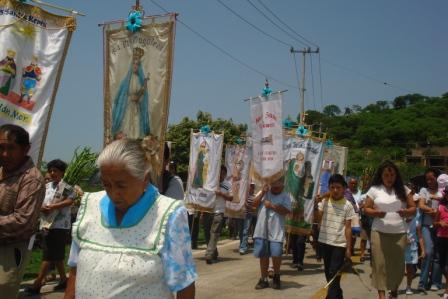
This piece is part of a book in process entitled "Magic Conversations: Interviews with Shamans, Directors and Scientists."
